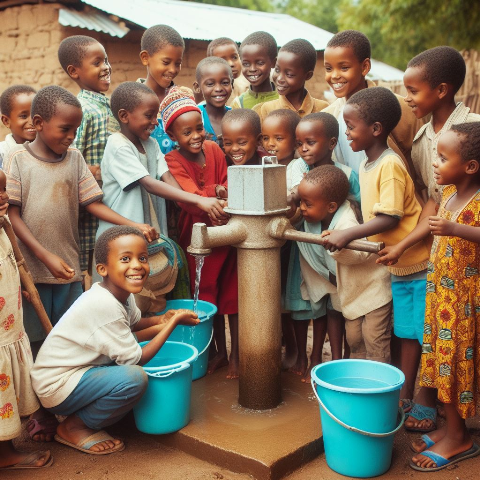Uganda Confronts Climate Challenges to Urban Water Systems
“Climate change primarily affects us through water, either by excess or scarcity,” said Osward Chanda, Director for Water Development and Sanitation at the African Development Bank.

- Country:
- Uganda
Uganda, renowned for its lush landscapes and abundant water sources, is facing severe threats to its urban water systems due to climate change. Increasingly variable rainfall patterns are leading to extreme hydrological events, including floods and droughts. These extreme events, coupled with rapid urban population growth, are stressing water supply and sanitation infrastructure, resulting in frequent service interruptions and heightened vulnerability to waterborne diseases.
Climate Change Impact on Water Management
“Climate change primarily affects us through water, either by excess or scarcity,” said Osward Chanda, Director for Water Development and Sanitation at the African Development Bank. “Integrating climate change considerations into water management is crucial for ensuring water availability and sustainability for current and future generations.”
Government and Development Partners' Initiatives
Recognizing the urgent need for resilient infrastructure, the Ugandan government, alongside development partners such as the African Development Bank, World Bank, KfW, UNICEF, and Austria Development Corporation, have formulated a plan to revolutionize urban water management to adapt to climate variability and change. The plan includes the third phase of the Promoting Climate Resilient Urban Infrastructure in Lake Victoria Water and Sanitation Project. This phase aims to enhance urban water resilience through technical assistance approved by the Bank and the Climate Investment Funds (CIF) Pilot Program for Climate Resilience Business (PPCR).
Program Phases and Expansion
The program’s first phase, funded by the Bank and implemented through UN-HABITAT, initially focused on 10 towns in Uganda, Kenya, and Tanzania. The second phase expanded to 15 towns across the Lake Victoria basin, including Rwanda and Burundi, benefiting approximately 60,000 people. The third phase, incorporating lessons from earlier phases, emphasizes the need for infrastructure investments and institutional capacity building for sustainable water services. This phase integrates climate resilience measures, such as weather statistics, real-time water resource tracking, strengthened early warning systems, and climate considerations into system design.
Objectives and Implementation
The project’s objectives are to:
Enhance the durability and reliability of water supply and sanitation infrastructure to withstand climate-induced extremes.
Incorporate advanced technological solutions and green infrastructure to improve system adaptability and efficiency.
Foster good governance and community participation in water management to ensure sustainable and locally relevant solutions.
Key initial steps include conducting vulnerability assessments in major urban centers to identify infrastructural weaknesses, implementing resilient urban water and sanitation systems for year-round access and services, and enhancing adaptive capacity by strengthening the regulatory framework for better preparatory and contingency planning.
Technological Innovations
Deploying smart-grid water technologies will transform water monitoring and distribution in Ugandan cities, allowing real-time adjustments to match usage and supply. This technology can significantly mitigate water shortages during droughts and overflows during heavy rainfall.
Commitment to Climate-Proofing
“The Bank remains committed to climate-proofing Uganda’s urban water and sanitation systems as a transformative step towards strengthening community resilience and fostering sustainable development,” said Anthony Nyong, Director for Climate Change and Green Growth at the African Development Bank. “By enhancing the climate resilience of the infrastructure, our goal is to ensure that every citizen has access to clean water and sanitation, improving health and quality of life in urban areas.”
Benefits and Future Prospects
An estimated half a million residents in greater Gomba, Bugadde, and Rakai, especially those in underserved informal settlements, will directly benefit from the project. By bolstering urban water resilience, Uganda aims to attract economic investment that promotes sustainable development. The project also serves as a model for other regions facing similar climate challenges, showcasing the advantages of proactive climate adaptation and community engagement.
Uganda’s commitment to integrating climate considerations into urban water and sanitation planning is a forward-looking strategy for sustainable and resilient urban development, addressing current challenges while setting a precedent for other nations to ensure urban areas thrive amid increasing global climate unpredictability.
The African Development Bank Group’s Upcoming Annual Meetings
The African Development Bank Group’s upcoming Annual Meetings in Nairobi are a golden opportunity to showcase the Bank’s successes as a catalyst for Africa’s transformation. Over five days, the Bank’s management and governors will meet to exchange ideas and forge new relationships with government and private sector partners, aiming to create a more inclusive, sustainable, and resilient Africa.
Celebrating 60 Years and Planning for the Future
The Bank is also celebrating its 60th anniversary this year. The Nairobi meetings will not only reflect on past achievements but also look to the future, playing a leading role in supporting Africa’s transformation. The High 5s strategy, initiated by Bank President Dr. Akinwumi Adesina, includes:
Light Up and Power Africa
Feed Africa
Industrialize Africa
Integrate Africa
Improve the Quality of Life for the People of Africa
Strategic Investments and Future Goals
The Bank’s new Ten-Year Strategy aims to scale up investments in these areas under the banner “Ambition for 2033.” The strategy focuses on achieving gender equality, investing in youth, responding to climate change, building resilience to shocks and conflict, and strengthening economic governance. The Bank seeks to create a prosperous, equitable, and sustainable future for Africa, integrating green growth and resilient economies.
Conclusion
Africa needs $1.3 trillion annually to meet its sustainable development goals by 2030. Dr. Adesina argues that a more responsive, inclusive, and accountable international financial system is essential to support global development acceleration. The Annual Meetings will discuss how Africa’s vast natural resources can be better valued and utilized, enhancing the continent’s economic outlook and addressing development challenges. The African Development Bank continues to play a key role in transforming the continent, promoting sustainable development, and fostering a resilient and equitable Africa.
- READ MORE ON:
- Osward Chanda
- Uganda
- climate change
- urban water










